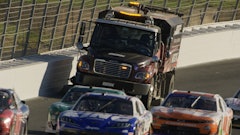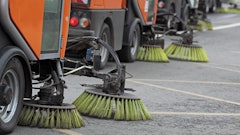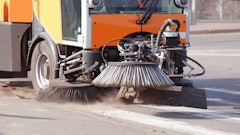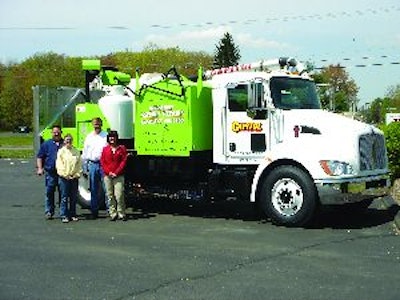
The story of Capitol Sweeping Services is one of transformation and adaptation. It's a story of what happens when a mom-and-pop contractor pays close attention to its market, and what happens when the couple has the foresight to plan and the guts to make changes on the move. It's the story of a successful contract sweeper who works to command market share, which enables it to dominate within regions and pick up even more accounts.
"We keep our eye on the ball and are able to make changes immediately within our market and within our company," says Tom Kuhns. "That's really what has kept us moving ahead and helped us gain market share."
Celebrating its 22nd anniversary this year, Capitol Sweeping Services is a minority-owned business, with Lesa Kuhns, president, running the day-to-day operations; husband Tom is vice president; and Dave Fisher is operations manager and the company's first full-time salesperson.
A member of the North American Power Sweeping Association, Capitol Sweeping Services runs a Shopping Center Maintenance Division, a Road Maintenance Division, and employs 22 employees full time, year round (employment can double during peak season).
Headquartered in South Windsor, CT, Capitol Sweeping covers the entire state, plus Rhode Island and western Massachusetts. Capitol Sweeping generates 65% of its revenue from litter sweeping, 20% from road sweeping (including catch basin cleaning), and the balance from line striping, pavement repair, snowplowing, and power washing.
The first adjustment
And while sweeping is now the company's focus, Capitol Sweeping Service was actually started as a part-time striping company. Tom worked full-time as a mechanic, doing layout and striping for new construction on weekends and off hours, and Lesa stayed at home with three children and handled the books. But as construction boomed, Tom quit his job to handle all his striping customers.
To prepare the pavement prior to striping the Kuhns always brought in a sweeping contractor. "But it got to the point where we were waiting too long for sweeping companies to come and sweep, so we bought a sweeper so we wouldn't be waiting anymore."
Initially the sweeper was used just to clean parking lots before striping, but the Kuhns quickly added a few small litter sweeping accounts, and sweeping quickly outpaced the striping. By their fifth year in business they had six employees and had become a full-fledged contract sweeper with 15 accounts. For the first five years Capitol Sweeping focused on parking lots, added municipal work in years five to 10, added highway sweeping after year 10, and got out of highway sweeping around year 15.
Pursuing market share
As Kuhns says, the sweeping business is the driving force behind the company's success. Sweeping provides steady cash flow, keeps the contractor's name in front of its customers and prospects, and strengthens financials so that if they go to the bank looking for support, their sweeping numbers show they deserve it.
And the constant throughout all this growth and diversification has been litter sweeping for shopping centers. "That end of the business is just growing and growing," Kuhns says. "It's very profitable for us. We do high volume and make a little bit on everything."
Kuhns says they are not a low-bid contractor - they don't want that kind of work - but they aren't the highest bid contractor in their markets either. Their approach is to pursue contracts on anchor accounts in a region, then fill in around those accounts, developing market share and increasing profits of a particular route in the process.
"We do own market share in a number of different areas, and that really helps us when we are pursuing new accounts nearby," Kuhns says. "We're not the lowest price but because of the market share we have in certain areas we don't have to do a lot of driving to get to single accounts. If I'm right next door to an account I can do it cheaper than a guy who has to drive there to do that one account."
Kuhns puts a lot of responsibility on the company's 25 drivers, most of who have been with the company for more than 10 years, and the company's systematic approach to the business helps the drivers, and the support employees, succeed.
"Our drivers do not have time limits on their accounts," Kuhns says. "We stay until the job is completed, and we're able to do that because our drivers don't have 15 or 16 accounts a night. They have eight or nine accounts at most so they don't have to rush to get them done, so they can get them done well."
And to boost efficiency on routes with sites close together Capitol Sweeping will often put two people - one sweeping the other handpicking and with a blower - in a single truck. "That way they can get the lot done the way it needs to be done and we can still get off the lot quicker."
Kuhns says the company's drivers are focused and well trained, and cross-trained on all regular accounts. "Everybody knows every account here," Kuhns says. "One of the nice things about having each driver responsible for only eight or nine accounts is if someone doesn't show up you can split up his accounts among the other eight or nine guys. They might have to stay an hour later but the accounts all get done. We never miss an account."
Support for the drivers is provided by two full-time mechanics who work staggered shifts to make sure drivers can communicate directly with a mechanic when they need to.
"The maintenance on the trucks is what makes us operate so efficiently. We're huge on maintenance," Kuhns says. One mechanic starts at 6 a.m. so if there's a problem with a sweeper the driver can explain the problem directly to a mechanic. "Because he's in there early he can hear directly from the driver what the problem is and can hopefully get that truck back out on the road that same night."
Diversification & infrared
Just as the Kuhns have thought through their approach to the sweeping market, they also realize that sweeping can't carry the entire growth of the company. So they have pursued diversification within the sphere of pavement maintenance.
"We don't sub out anything," Kuhns says. "Everything we do is done in-house, from hanging signs, to replacing bollards, to repairing parking lot pavement." The company also has additional real estate holdings, so it has a full-time carpenter on staff. "We can even send him out to take care of our customers' property if they need some work done immediately. It's a value-added service to our customers."
One of the first diversification efforts was catch-basin cleaning, which Capitol Sweeping has offered for a while but brought in-house in 2006 when they bought two 16-yard Vac-Alls. "Catch basin cleaning in New England is what the Americans with Disabilities Act was for stripers 15 years ago. Few people knew about it and nobody enforced it but now they're starting to."
And beginning this year Capitol Sweeping is adding infrared repair and the many services it can offer. Capitol Sweeping bought a large Ray-Tech unit at the 2008 National Pavement Expo in Nashville and "there's no doubt in my mind infrared is going to work for us," Kuhns says.
"Traditionally we have done pothole repairs but now instead of just throwing cold patch into a hole we're now able to make a nice patch with infrared," Kuhns says. He says eventually Capitol will use the infrared equipment for other work in addition to potholes including repairing utility cuts, custom stamping, and repairing pavement around catch basins where they sink and crack.
"We don't have layoffs so we've got to find different avenues of work to keep us growing," Kuhns says. "With this type of work we feel we actually get paid for what it's worth, not like sweeping where prices have come down year after year after year."
The value of information
Kuhns credits much of the company's success to its insistence on collecting sharing, analyzing, and if necessary acting on information.
"But you have to be diligent with it," Kuhns says. "If you're getting information and you're not doing anything with it, it's useless."
Collecting information begins when the drivers arrive at 10 p.m. for the night shift. They pick up their route sheet, which contains the accounts, routes, and any special instructions. "It's all in the paperwork," Kuhns says. "We've mapped out the shortest routes and we know how long it takes to sweep it and drive it, so they just need to follow the paperwork."
Drivers are required to check the vehicle before heading out, completing a number of pre-trip questions, and Fisher often leaves small surprises - such as a note on the oil dipstick tube reading "Come see Dave Fisher - You've won a prize!" to help drivers do their required checks. "When the driver comes Dave will give him $10 or maybe a coupon for a free car wash, fun things like that," Kuhns says. "But they're fun things with a purpose. They get to the point; these guys will lift the hood."
Drivers then complete the log throughout the night, noting where they worked, where they dumped, what time they dumped, plus any other information about a particular account. "It's mandatory that drivers fill out the logs, because we look at them on a daily basis," Kuhns says. "We're looking for problems on the site. We're looking for things we can alert the client to - illegal dumping, for example, or where somebody drove down a stop sign, or potholes on the parking lot."
First thing in the morning the mechanic pulls the log to see if any work needs to be done on the vehicle. If there is, large or small, he writes a work ticket to schedule the repair. Next the logs are turned in to the office, where they are reviewed by Fisher or Hannah Smith, office manager. If they see something in the logs they bring it to attention of either Lesa or Tom. Information from the logs is then entered into the computer, and then the sheets with updated information are printed out late in the afternoon for that night's drivers.
This and other information is shared with employees at monthly company-wide meetings on a Friday - a payday - that employees must attend to receive their paycheck.
"We make it a point to share information with our people and then they share information with us," Kuhns says. "As long as we have that we can figure the rest out."
Cost Savings = Being Competitive
Capitol Sweeping Services keeps a close watch on its numbers, making adjustments that enable them to remain competitive - and more profitable. Among the changes Capitol Sweeping has made are:
- Buying single-engine sweepers to save on fuel. "Some contractors buy them because of noise issues in their market but that's not that much of a problem for us. We bought them for the fuel savings," says Tom Kuhns. "We can save four gallons per night with those, and at $4.50 per gallon for diesel that's significant for us."
- Buying garbage bags in bulk. "We buy two pallets at a time, and the savings is huge," Tom Kuhns says. "We save on cost of the bags, and we save on cost of trucking them in."
- Buying fuel wholesale. Kuhns says Capitol Sweeping stores 4,500 gallons of fuel in its yard. "We have it delivered and that enables us to save 20 to 25 cents off the pump price," Kuhns says. "We use 4,000 gallons of gas every three weeks to run our fleet so that was a huge savings."
- Operating its own garbage trucks. To save money and have greater control over disposal Capitol bought two garbage trucks, which it runs twice a week, right before the weekend and right after the weekend. "We also have our own garbage cans and where we can put it we empty twice a week, before and after the weekend," Kuhns says.



![Pavement Awards 2025[main]](https://img.forconstructionpros.com/files/base/acbm/fcp/image/2024/05/PavementAwards_2025_main_.665883e4276e8.png?auto=format%2Ccompress&bg=fff&fill-color=fff&fit=fill&h=100&q=70&w=100)
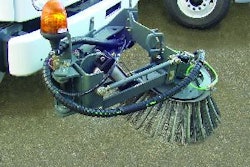
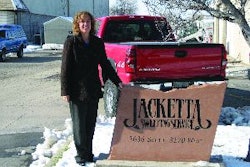
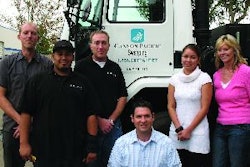
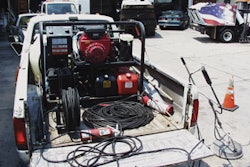

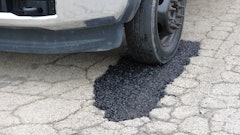


![Pavement Awards 2025[main]](https://img.forconstructionpros.com/files/base/acbm/fcp/image/2024/05/PavementAwards_2025_main_.665883e4276e8.png?ar=16%3A9&auto=format%2Ccompress&bg=fff&fill-color=fff&fit=fill&h=135&q=70&w=240)



